Posted by: Northwest Eye in General on May 18, 2025
Overview
The main focus of this article is to offer essential tips for a successful recovery after LASIK surgery. We understand that this can be a significant time for you, and it’s important to follow post-operative care guidelines closely.
- Adhering to prescribed eye drops
- Managing your expectations regarding vision changes
- Attending follow-up appointments
These are crucial steps that contribute to optimal healing and your overall satisfaction. Remember, we are here to help you through this process.
Introduction
Navigating the recovery process after LASIK surgery is crucial for achieving optimal results and ensuring a smooth transition to clearer vision. We understand that this journey can be both exciting and a bit daunting. Adhering to the post-operative instructions provided by Northwest Eye is not just a suggestion; it’s a vital component that can significantly impact your healing and overall satisfaction.
From managing expectations about vision changes to understanding the importance of follow-up appointments, each guideline plays a pivotal role in your recovery journey. This article delves into essential post-operative care tips, emphasizing the significance of:
- Communication with your healthcare providers
- The importance of hydration and nutrition
- The need to protect your eyes from irritants
By prioritizing these recommendations, you can enhance your recovery experience and embrace the transformative benefits of LASIK surgery. We are here to help you through this process.
Follow Northwest Eye’s Post-Operative Instructions for Optimal Recovery
After your eye surgery, we understand how important it is to follow the specific post-operative guidelines provided by Northwest Eye. These guidelines cover essential aspects of eye care, medication usage, and activity restrictions, all aimed at ensuring your comfort and safety. Compliance with these recommendations is vital for optimal healing and significantly reduces the risk of complications, such as infection or inflammation.
Data indicates that individuals who carefully adhere to post-operative care guidelines experience a more seamless healing journey. In fact, over 98% express contentment with their vision after LASIK surgery. Moreover, those who have undergone corrective eye surgery report greater satisfaction with contact lens use compared to those who do not have the procedure. This emphasizes the transformative advantages of the surgery in improving daily activities and overall quality of life.
Expert opinions reinforce that following post-operative guidelines is not just beneficial but essential. Dr. M. Ronan Conlon, an ophthalmologist, states, “The information on this page should not be used in place of information provided by a doctor or specialist,” underscoring the importance of adhering to medical advice. Individual narratives from patients further support this idea, highlighting how following post-operative care has led to remarkable healing stories, as illustrated in the case study titled ‘Patient Testimonials on Vision Correction Experience.’
In summary, prioritizing the post-operative care instructions from Northwest Eye is a critical step toward achieving the best possible results from your eye surgery. We are here to help you through this process and ensure your recovery is as smooth as possible.
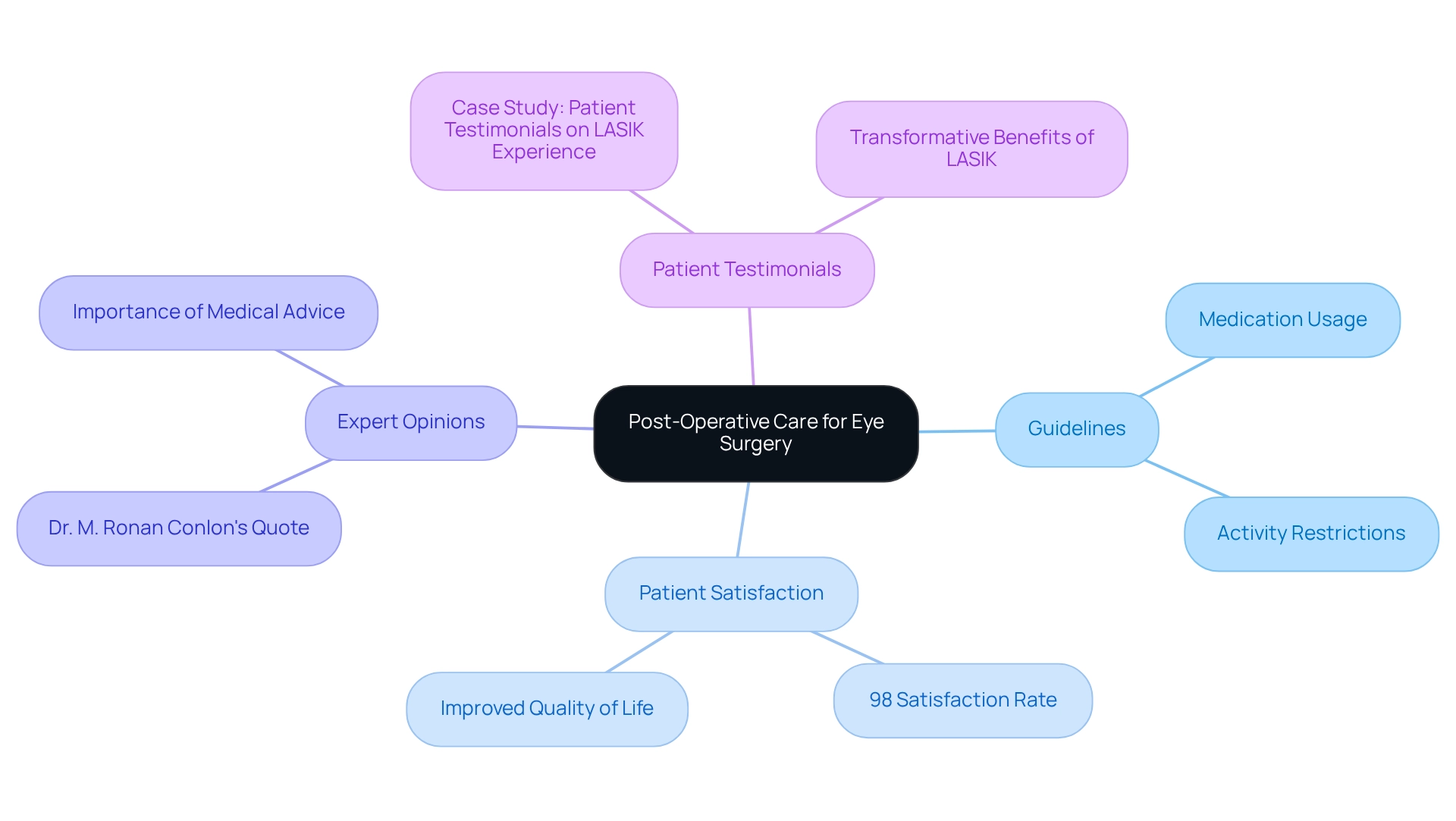
Schedule Follow-Up Appointments with Northwest Eye to Monitor Recovery
Arranging and participating in all follow-up visits with Northwest Eye after vision correction surgery is essential for a successful recovery. We understand that this can be a concerning time, and the first follow-up typically occurs within 24 to 48 hours post-surgery. This visit allows your eye doctor to assess your healing progress and vision clarity.
Regular monitoring during these visits is crucial. It helps identify any potential complications early on, ensuring timely intervention if necessary. As Jonathan Pirnazar, M.D., observes, “With modern technology, including the femtosecond laser for creating the flap and topography-guided laser treatments, almost all vision correction complications can be addressed.”
Research shows that individuals who comply with follow-up care achieve considerably improved results. High satisfaction levels are reported among LASIK surgery recipients, and this satisfaction is closely linked to consistent follow-up, which is a key component of the recovery process. Moreover, you can enhance your likelihood of surgical success by proactively overseeing your general health and adhering to your physician’s post-operative guidelines.
At Northwest Eye, we offer a comprehensive range of services, including specialties in cataracts, glaucoma, and pediatric care. This underscores our commitment to providing thorough eye care. We also understand that financing can be a concern, which is why different funding options exist to make eye surgery and other vision care services more accessible. We are here to help you obtain the assistance you need for optimal visual outcomes.
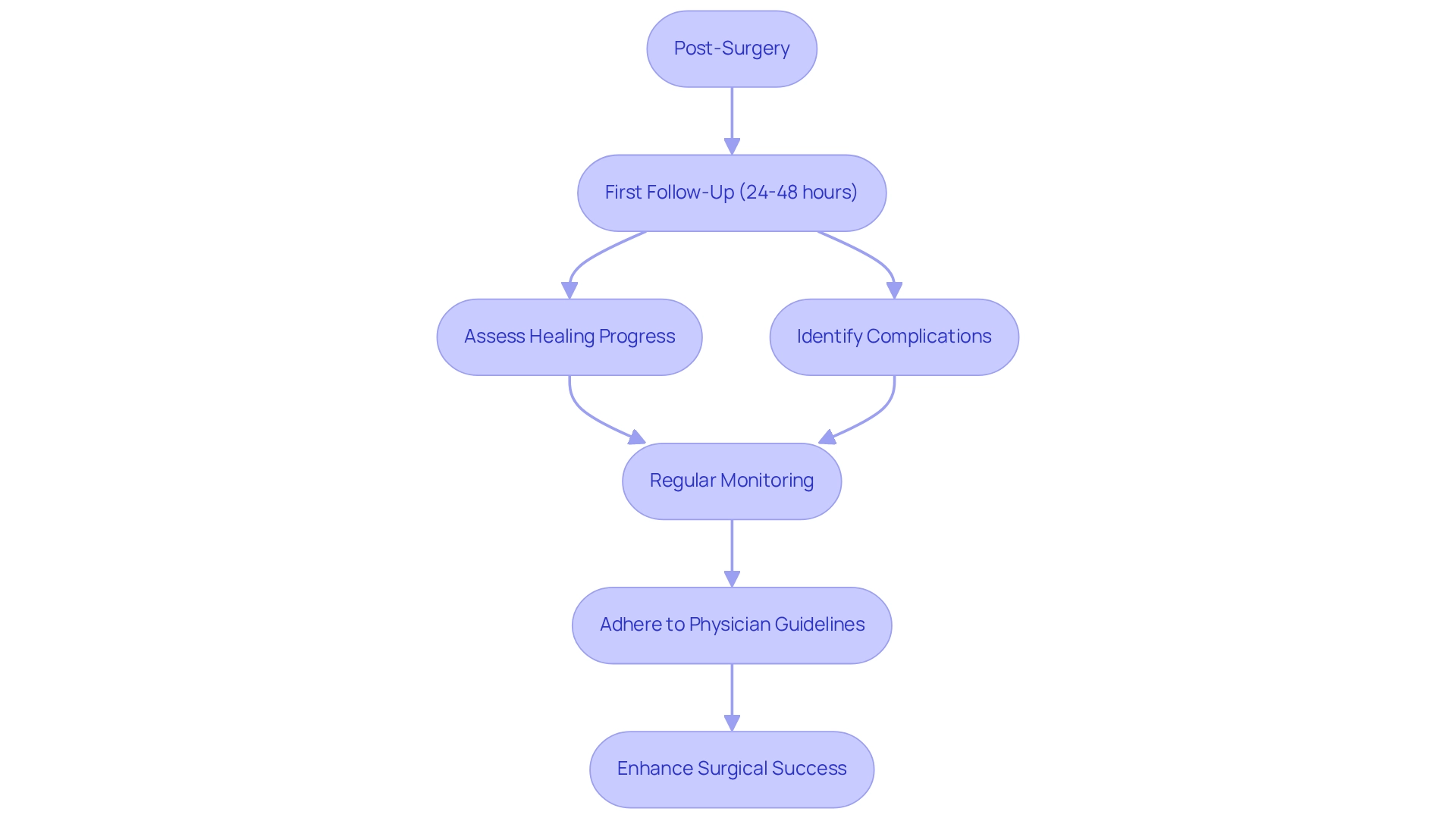
Manage Expectations for Vision Changes After LASIK Surgery
After laser eye surgery, we understand that it’s common for individuals to experience variations in their eyesight as the recovery process progresses. Many report noticeable improvements within the first few days, but it’s also normal to encounter temporary issues, such as blurriness and light sensitivity. Blurred vision may arise from various factors, including uncorrected refractive errors, which can be exacerbated during healing. After undergoing LASIK, you can typically resume many regular, low-impact activities the day after the procedure, helping to manage expectations regarding healing timelines. However, complete stabilization of vision may take several weeks to months. It’s crucial to maintain open communication with your eye care provider about any concerns you may have.
Post-operative follow-up includes:
- A phone call the day after surgery
- Visits scheduled one week and one month later
This ensures that any vision changes are monitored closely. Recognizing that these fluctuations are a normal aspect of recovery can help you manage your expectations effectively.
Expert insights highlight the significance of personalized evaluations, as each individual’s experience can differ greatly. A case study emphasizes the importance of choosing a skilled surgeon with the proper training and experience in LASIK, underscoring that comprehensive assessments are essential for identifying the most suitable LASIK vision correction option. By sharing your experiences, you can gain reassurance and support during this transitional period, ultimately contributing to a more positive recovery journey. Additionally, Northwest Eye is currently providing a complimentary consultation for vision correction to assist potential patients in deciding if this procedure is appropriate for them.
It’s important to note that while the procedure is generally safe, there have been extremely rare documented instances of blindness from complications. This underscores the need for informed decision-making. We are here to help you through this process.
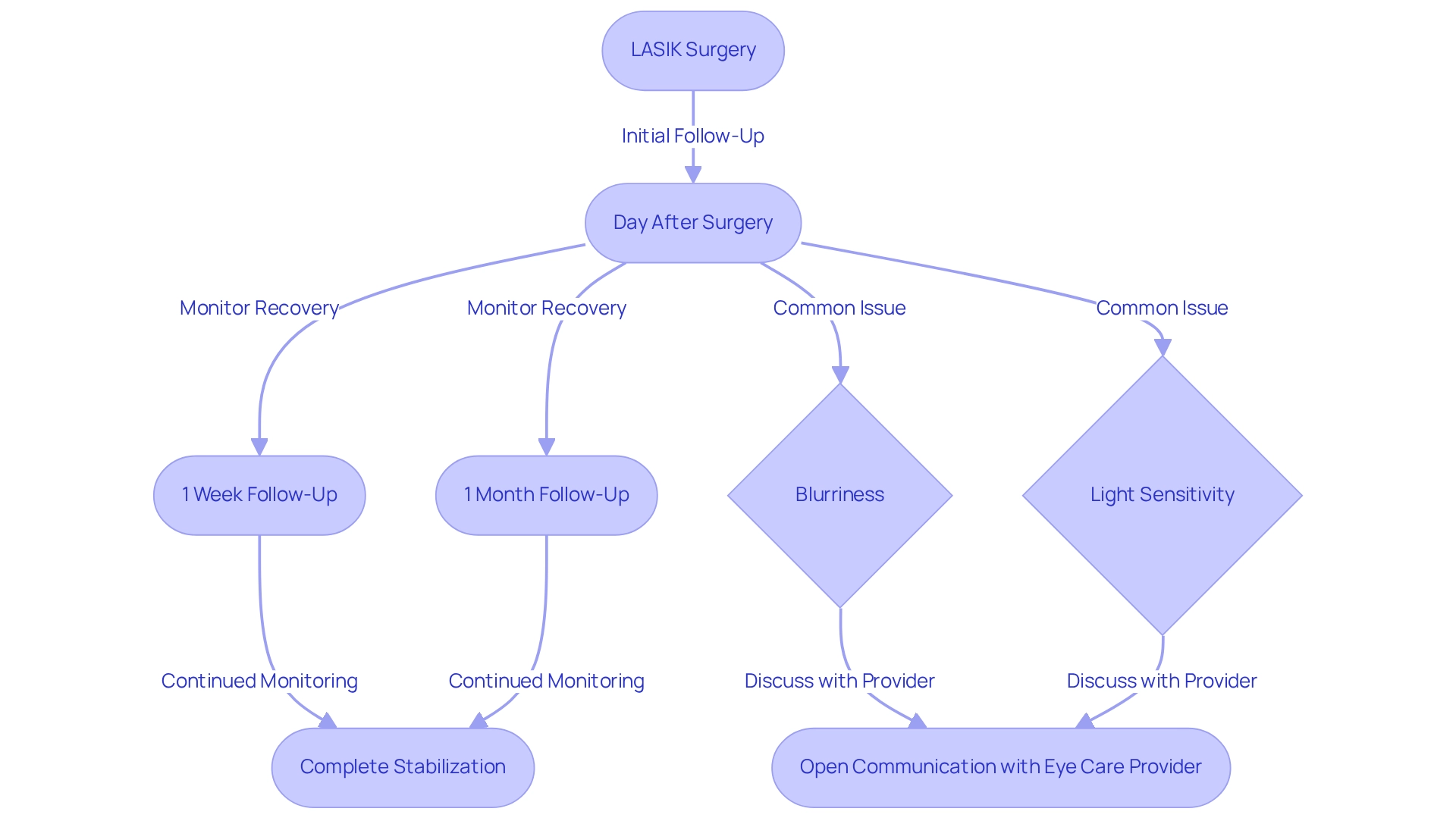
Avoid Strenuous Activities to Promote Healing After LASIK
After vision correction surgery, we understand that you may have concerns about your recovery. It is essential to avoid strenuous activities like heavy lifting, intense workouts, and contact sports. Engaging in these activities can place excessive strain on your eyes, potentially complicating the healing process. Remember, LASIK eye surgery has a high success rate, but outcomes can differ depending on personal eye health and aftercare. Instead, we encourage you to prioritize gentle activities that promote relaxation and allow your body to recuperate effectively.
For instance, light walking is encouraged a few days post-surgery, but it’s important to avoid strenuous exercises for at least two weeks and contact sports for a month. Following these guidelines greatly lowers the chance of complications, such as flap dislocation or dry eye, which can hinder healing. A case study named ‘Exercise Guidelines After Eye Surgery‘ suggests that adhering to these exercise recommendations aids in avoiding unintentional eye injuries during the healing period. Eye care specialists stress that appropriate aftercare, including steering clear of intense activities, is crucial for attaining optimal outcomes from LASIK. By following these recommendations, you can improve your healing experience and ensure a smoother transition back to your regular routines. We are here to help you through this process, and your well-being is our top priority.
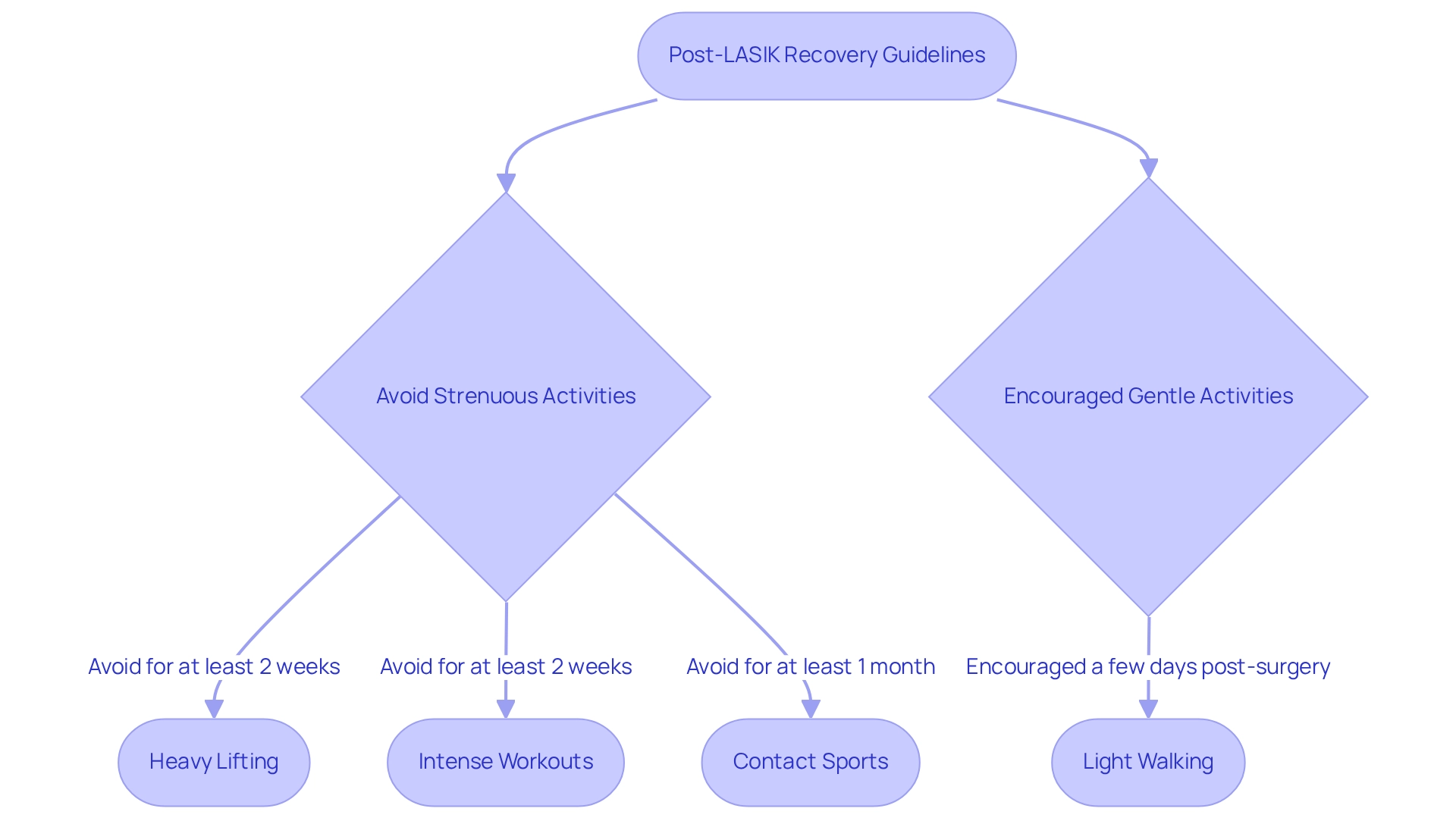
Use Prescribed Eye Drops to Prevent Dryness and Aid Healing
After laser eye surgery, we understand that following your eye doctor’s recommended routine of antibiotic and anti-inflammatory eye drops is crucial for avoiding infection and reducing inflammation. These drops not only assist in healing but also play an essential role in keeping your vision moisturized and comfortable during the healing process. It’s common to feel concerned about LASIK, particularly since statistics indicate that around 20-30% of individuals who undergo LASIK experience dryness after surgery. Therefore, using these medications as instructed is essential.
In addition to the prescribed drops, incorporating preservative-free artificial tears can further alleviate dryness and irritation, enhancing overall comfort. Expert opinions underscore that proper management of dryness is crucial for a successful recovery, as it can significantly impact visual outcomes. As noted, “ASA individuals rarely experience dry eyes because the corneal nerves aren’t cut, and it’s a much safer eye surgery with better outcomes.”
We want to reassure you that case studies have shown patients who diligently follow their prescribed eye drop regimen report better healing experiences and fewer complications. For instance, Carnita H. shared her experience with Dr. Khambati, praising the first-rate vision correction and surgical services provided. Her story highlights the effectiveness of adhering to prescribed treatments.
Consequently, emphasizing the application of these eye drops is a crucial step in ensuring a seamless healing process following LASIK surgery. Remember, we are here to help you through this process, and taking these steps can make all the difference in your recovery.
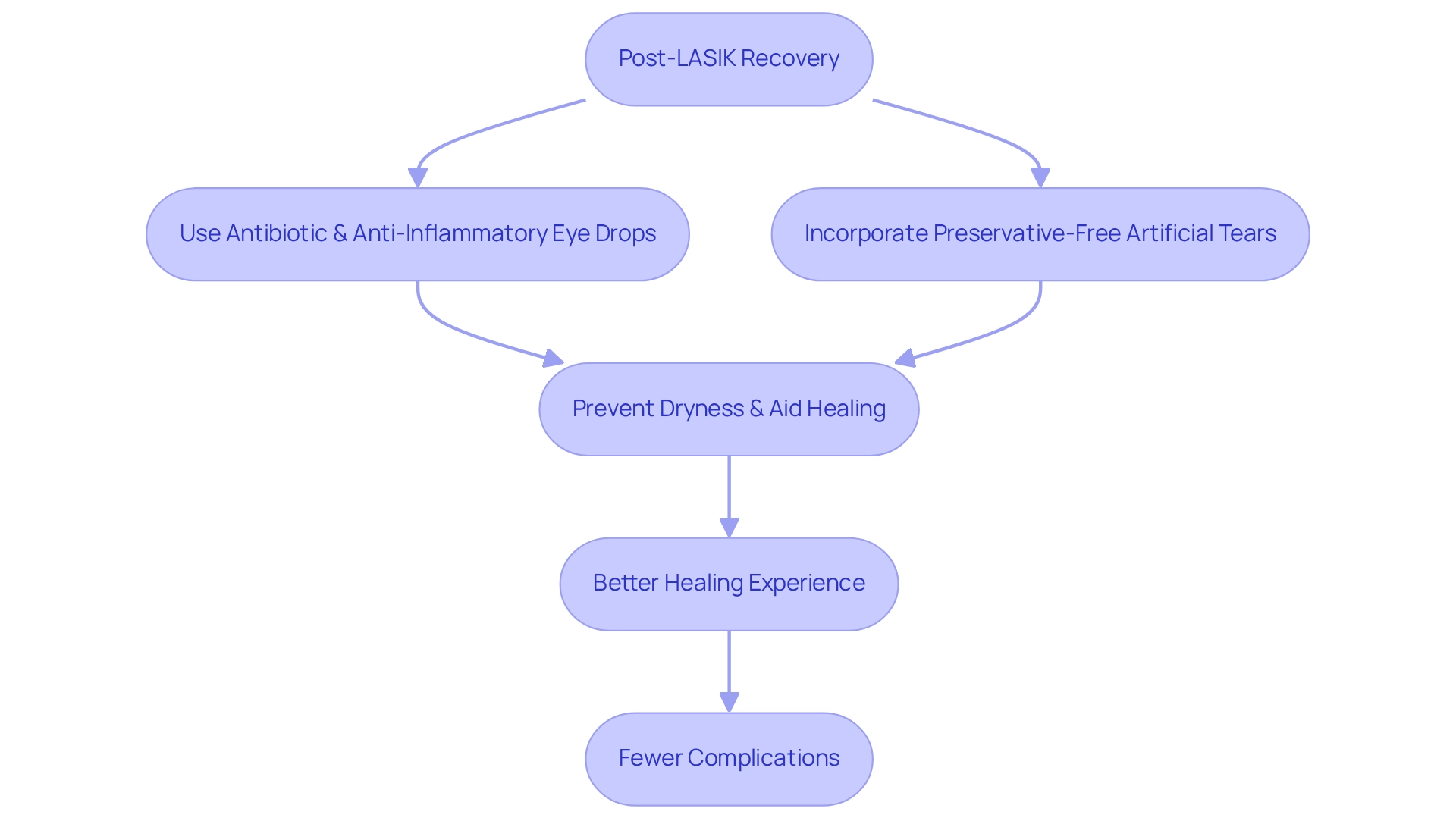
Protect Your Eyes from Irritants and Bright Lights During Recovery
We understand that during your healing process after lasik, it is essential to protect your vision from irritants such as dust, smoke, and strong winds. These environmental factors can significantly impact your recovery. Wearing sunglasses with UV protection when outdoors not only shields your eyes from bright lights but also minimizes discomfort caused by glare. The cornea plays a crucial role in blocking harmful UV rays from the sun and safeguarding the eye from germs and bacteria, which is vital for preserving eye health during this time. Research shows that exposure to harmful UV rays can impede healing, making protective eyewear essential.
It’s common to feel sensitive to bright screens and harsh lighting, so avoiding direct exposure can further support your healing. Using artificial tears and taking regular screen breaks can alleviate dryness and enhance comfort, as highlighted in case studies on managing persistent dry eyes resulting from LASIK. Adhering to your physician’s guidance and utilizing medications correctly is essential for a successful healing journey. Additionally, the Eye Condition Library provides useful materials to assist you in understanding and managing your recovery efficiently.
By following these guidelines, you can enhance your overall healing experience and safeguard your vision effectively. Remember, we are here to help you through this process.
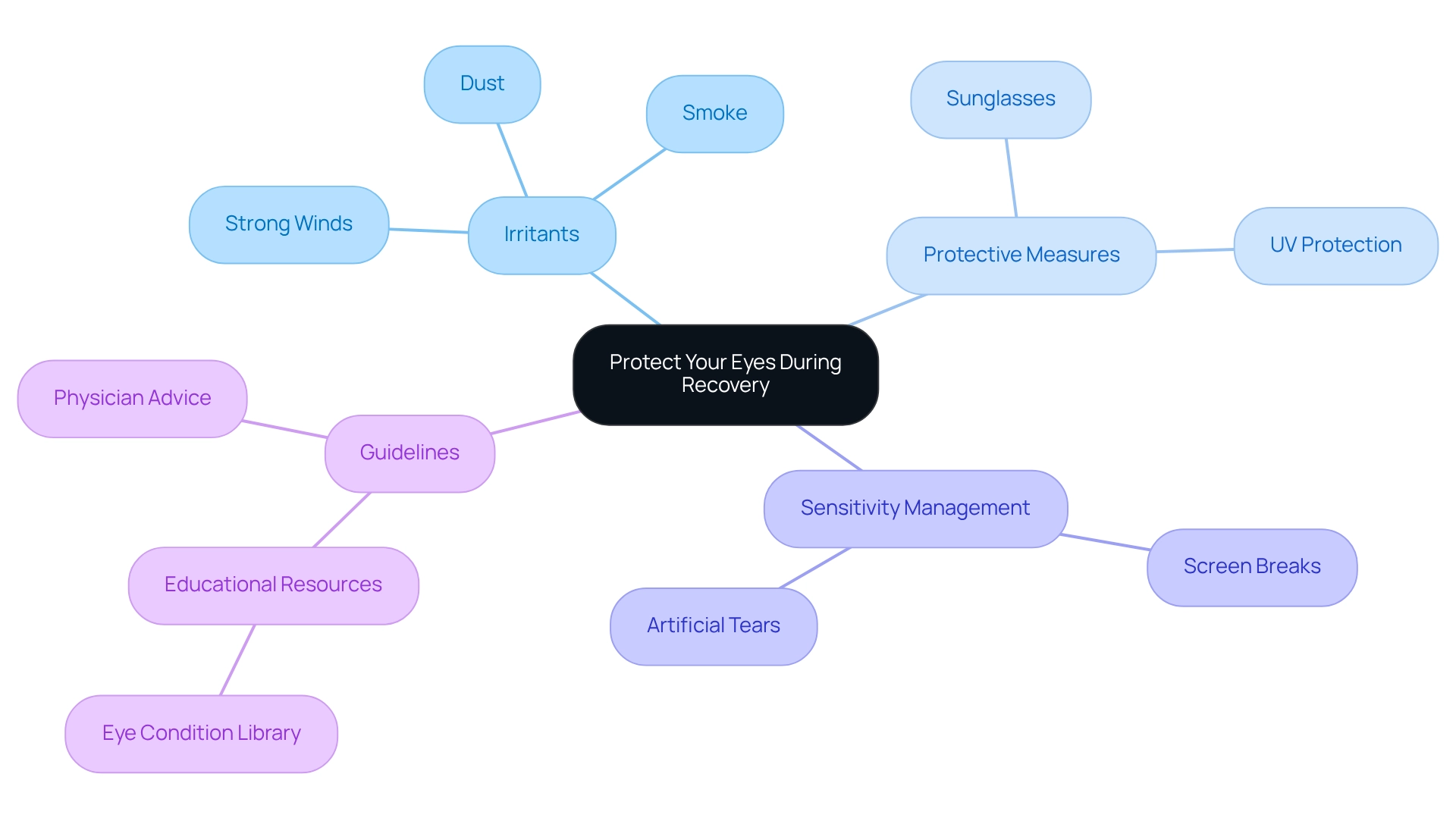
Stay Hydrated and Maintain a Healthy Diet for Recovery Support
Hydration is essential for a smooth healing process following lasik surgery. We understand that you may have concerns about your recovery, and adequate water intake plays a vital role in maintaining moisture levels in your eyes, which is crucial for healing.
Alongside hydration, a balanced diet rich in vitamins and minerals can significantly promote optimal healing. Focus on incorporating foods high in omega-3 fatty acids, antioxidants, and vitamins A, C, and E, as these nutrients are particularly beneficial for your eye health. For instance, green leafy vegetables like spinach and kale are excellent sources of these vital nutrients, supporting your overall eye wellness.
As Dr. Anton van Heerden notes, ‘Green leafy vegetables, including spinach, kale, and Swiss chard, are packed with key nutrients and antioxidants that support eye health.’ We recognize the significance of understanding how nutrition influences your recuperation. Making informed dietary choices can enhance your healing outcomes.
Moreover, staying hydrated not only assists in your rejuvenation but also supports long-term eye health. It’s common to feel overwhelmed, but case studies reveal that individuals who carefully monitor their hydration and dietary intake tend to experience more effective recoveries.
By gradually reintroducing healthy foods and ensuring adequate fluid intake, you can support your overall healing process after lasik. One such case study discusses when patients can gradually resume their normal diet after eye surgery, recommending a focus on healthy foods. Patients who thoughtfully reintroduce foods and observe their reactions tend to aid their overall healing process effectively.
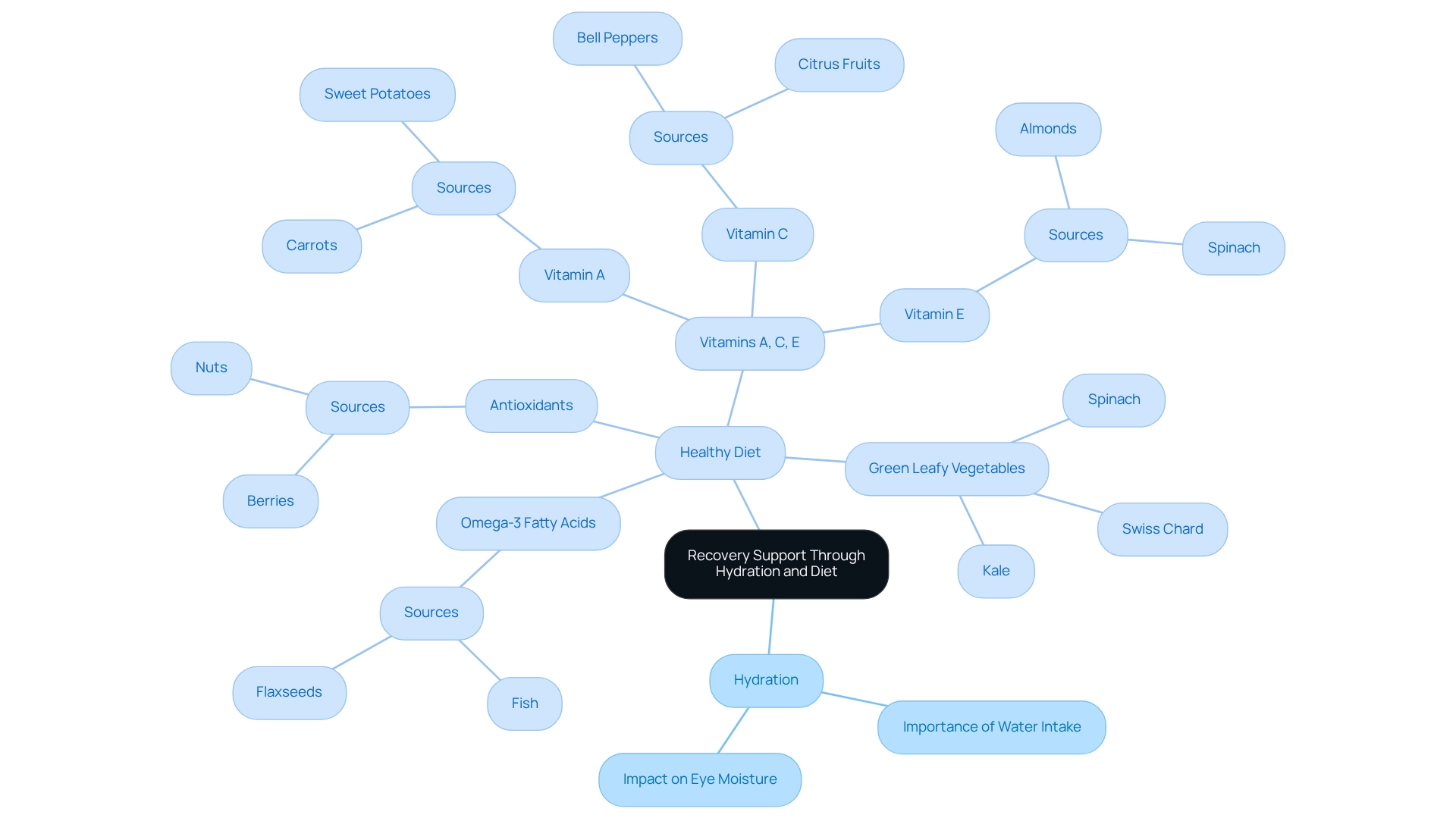
Get Adequate Rest and Sleep to Support Your Recovery
Rest and sleep are vital components of a successful healing process following LASIK surgery. We recommend aiming for 7-8 hours of quality sleep each night, as this allows your body to heal effectively. Studies show that sleep aids the healing process by diminishing pressure on your vision and maintaining moisture, which is crucial in the early healing stage. Furthermore, including brief naps during the day can further reduce eye strain and enhance your healing speed.
During the early stages post-surgery, it’s common to feel the urge to engage in activities that demand intense focus, such as reading or prolonged screen time. However, avoiding these activities helps minimize discomfort and promotes a smoother healing experience. A case study highlights the effectiveness of using protective shields during sleep, which prevents you from inadvertently rubbing or pressing on your eyes, thereby contributing to a safer recovery environment. These shields not only protect your eyes but also enhance the quality of your sleep, allowing for better healing.
Expert insights underscore the importance of allowing your vision to stabilize naturally. Dr. M. Ronan Conlon, a skilled ophthalmologist who has conducted over 40,000 refractive procedures, stresses, “By being tolerant and letting your vision stabilize naturally, you can enjoy the complete advantages of your eye surgery or PRK procedure.” By prioritizing sleep and rest, you can significantly enhance your healing process and overall satisfaction with LASIK. We are here to help you through this process, ensuring you feel supported every step of the way.
Avoid Eye Makeup and Lotions to Prevent Irritation Post-Surgery
We understand that undergoing LASIK surgery can be a significant step, and it is important to prioritize your recovery. For at least one week after the procedure, please avoid wearing makeup, such as mascara and eyeliner. These products can irritate your vision and significantly increase the risk of infection. In fact, studies indicate that using eye makeup post-surgery can lead to infection rates as high as 5%, underscoring the importance of this precaution.
It’s also essential to refrain from applying lotions or creams around your eye area until your ophthalmologist gives you the go-ahead to resume your normal skincare routine. This includes avoiding any facial products that may inadvertently come into contact with your eyes, as they can hinder the healing process. At Northwest Eye, we emphasize the significance of pre- and post-operative care for LASIK, which involves avoiding eye makeup and skincare items to improve your healing results.
Additionally, be sure to arrange your initial follow-up appointment within 24 to 48 hours following your LASIK surgery. Continued care is crucial for monitoring your progress and ensuring the best outcome. By prioritizing these guidelines, you can enhance your healing experience and minimize complications. Remember, it’s common to feel anxious about these changes, but we are here to help you through this process. Lastly, please avoid swimming in rivers, lakes, or the ocean while healing to further protect your eyes.
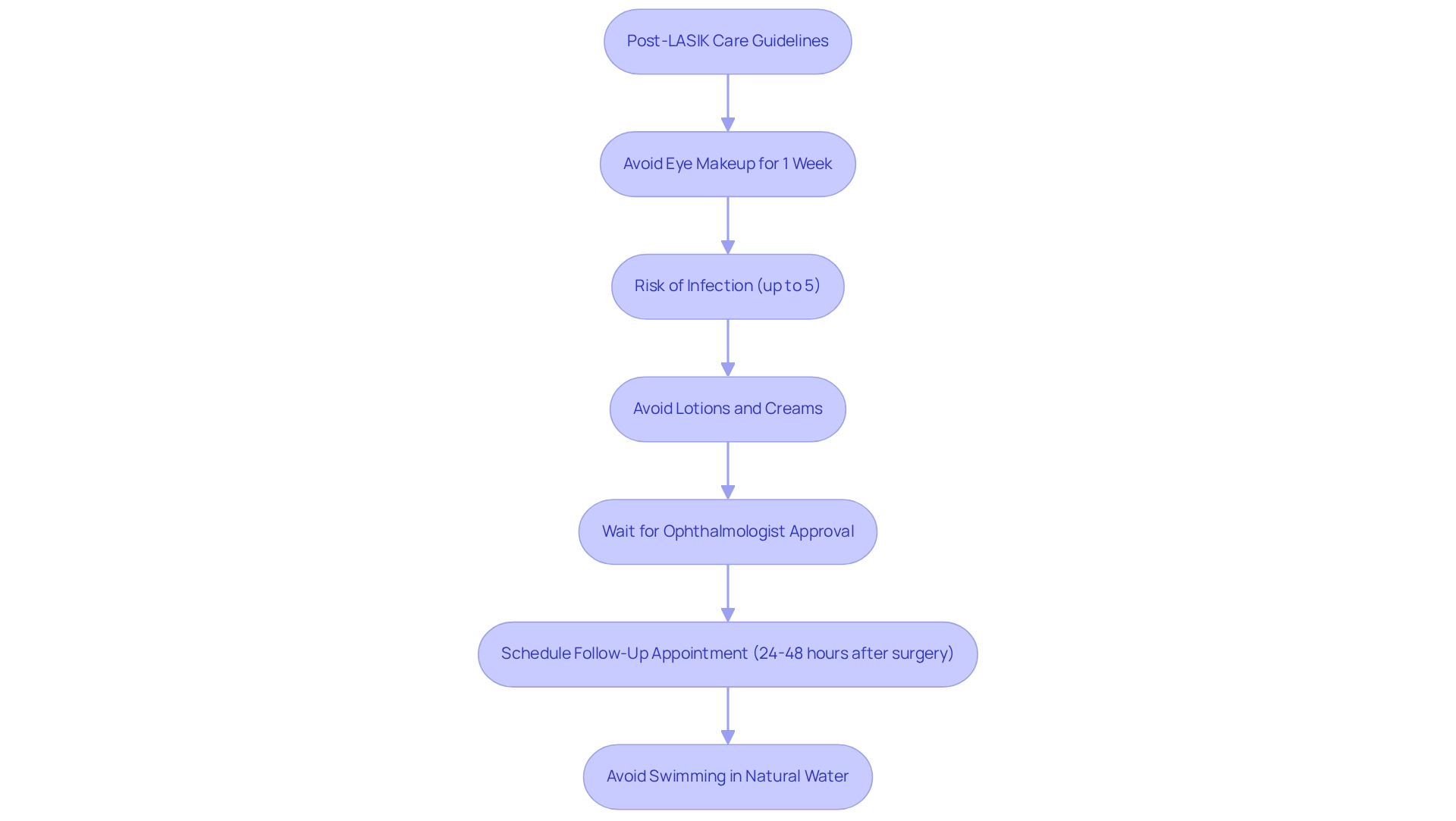
Communicate Any Unusual Symptoms to Northwest Eye for Timely Intervention
Following vision correction surgery, we understand that it’s vital to report any unusual symptoms to Northwest Eye without delay. Symptoms such as:
- Severe pain
- Significant changes in vision
- Persistent redness
warrant immediate attention. It’s common to feel concerned about these issues. Additionally, minor side effects like dry eyes—often linked to conditions such as Dry Eye Syndrome—are more common than severe complications, making it crucial to communicate these issues as well.
Blurred vision, which may arise from refractive errors or signal underlying eye diseases, should also be monitored closely. Timely intervention can effectively tackle potential complications, ensuring a smoother healing process. With 99.5 percent of LASIK patients achieving 20/40 vision or better, it is essential to maintain open communication with your healthcare team to safeguard your LASIK eye health.
If you experience any concerning symptoms, please seek professional medical help immediately. Remember, your well-being is our top priority, and your healthcare providers at Northwest Eye are dedicated to supporting you throughout your recovery journey. Schedule an appointment today for a thorough evaluation.
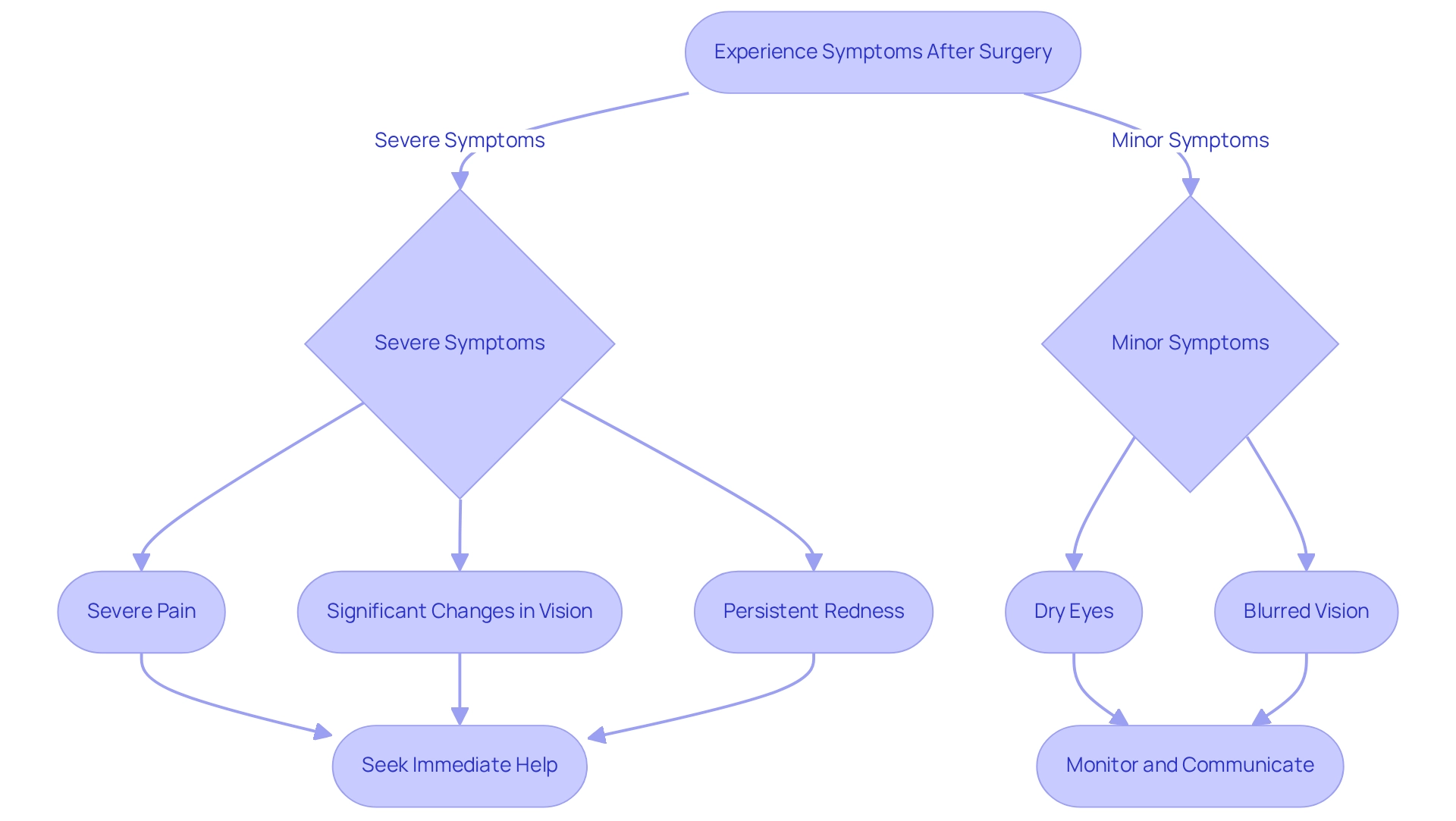
Conclusion
Prioritizing post-operative care after LASIK surgery is essential for achieving the best possible outcomes and ensuring a smooth recovery. We understand that this can be a time of uncertainty, and adhering to the specific instructions provided by Northwest Eye—such as managing expectations about vision changes, scheduling follow-up appointments, and using prescribed medications—plays a critical role in minimizing the risk of complications and enhancing overall satisfaction with the procedure.
Effective communication with healthcare providers is vital in monitoring any unusual symptoms that may arise during the recovery process. It’s common to feel anxious about any changes, but this proactive approach not only facilitates timely intervention but also empowers you to take charge of your healing journey. Additionally, maintaining a healthy lifestyle through proper hydration, nutrition, and adequate rest supports your body’s natural healing mechanisms, further contributing to a successful recovery.
By following these essential guidelines, you can embrace the transformative benefits of LASIK surgery while safeguarding your vision for the long term. With careful attention to post-operative care, you can look forward to enjoying clearer vision and an improved quality of life. Remember, we are here to help you through this process.
Frequently Asked Questions
Why is it important to follow post-operative guidelines after eye surgery?
Following post-operative guidelines is crucial for ensuring comfort and safety, promoting optimal healing, and significantly reducing the risk of complications such as infection or inflammation.
What percentage of individuals report satisfaction with their vision after LASIK surgery?
Over 98% of individuals express contentment with their vision after LASIK surgery.
How does post-operative care affect the recovery process?
Adhering to post-operative care guidelines leads to a more seamless healing journey and is linked to higher satisfaction levels among patients who have undergone corrective eye surgery.
What should patients do after their eye surgery regarding follow-up visits?
Patients should arrange and participate in all follow-up visits with Northwest Eye, starting with the first follow-up typically occurring within 24 to 48 hours post-surgery to assess healing progress and vision clarity.
What are common experiences during the recovery process after laser eye surgery?
It is common for individuals to experience variations in their eyesight, noticeable improvements within the first few days, and temporary issues such as blurriness and light sensitivity.
How can patients manage expectations regarding their recovery timeline?
Patients can manage their expectations by understanding that while many can resume low-impact activities the day after surgery, complete stabilization of vision may take several weeks to months.
What steps are included in post-operative follow-up care?
Post-operative follow-up includes a phone call the day after surgery and visits scheduled one week and one month later to monitor any vision changes closely.
What should patients do if they have concerns during their recovery?
It is crucial for patients to maintain open communication with their eye care provider about any concerns they may have during the recovery process.
What unique services does Northwest Eye provide?
Northwest Eye offers a comprehensive range of services, including specialties in cataracts, glaucoma, and pediatric care, as well as financing options to make eye surgery more accessible.
Are there any risks associated with laser eye surgery?
While laser eye surgery is generally safe, there have been extremely rare documented instances of blindness from complications, highlighting the importance of informed decision-making.






